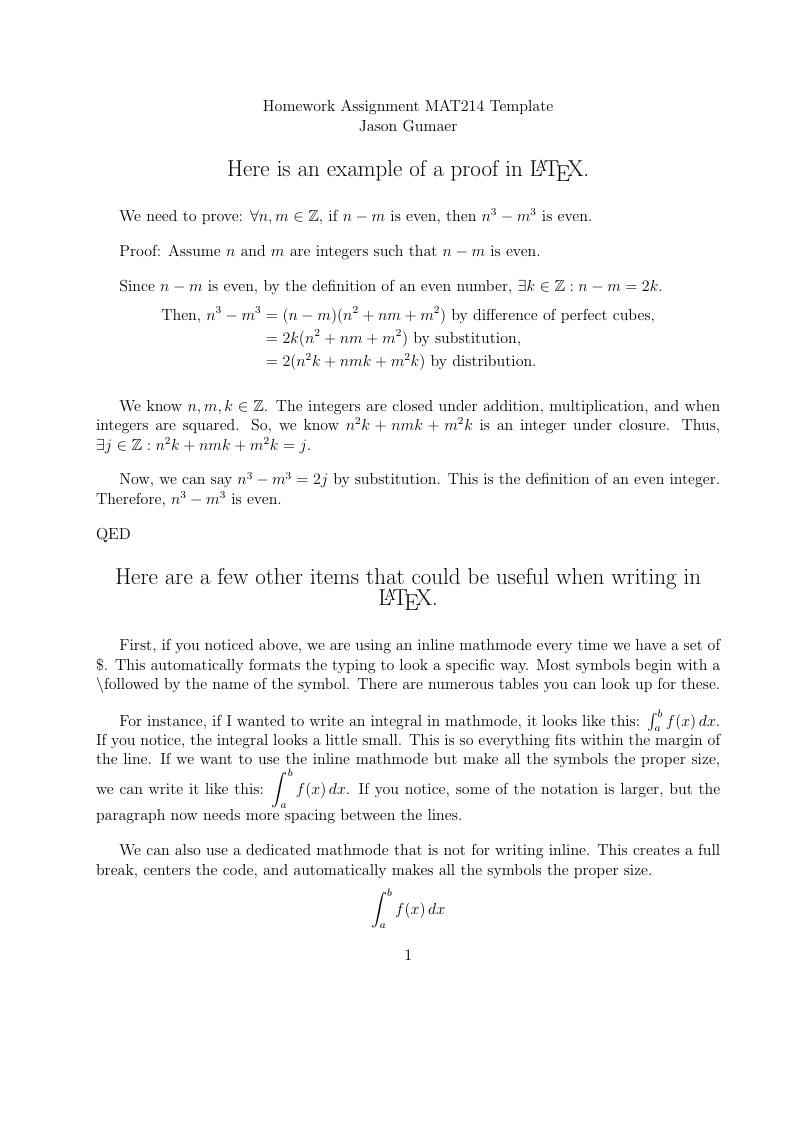
This is a LaTeX template for MAT214

\documentclass[12pt]{article}
% We can write notes using the percent symbol!
% The first line above is to announce we are beginning a document, an article in this case, and we want the default font size to be 12pt
\usepackage[utf8]{inputenc}
% This is a package to accept utf8 input. I normally do not use it in my documents, but it was here by default in Overleaf.
\usepackage{amsmath}
\usepackage{amssymb}
\usepackage{amsthm}
% These three packages are from the American Mathematical Society and includes all of the important symbols and operations
\usepackage{fullpage}
% By default, an article has some vary large margins to fit the smaller page format. This allows us to use more standard margins.
\setlength{\parskip}{1em}
% This gives us a full line break when we write a new paragraph
\begin{document}
% Once we have all of our packages and setting announced, we need to begin our document. You will notice that at the end of the writing there is an end document statements. Many options use this begin and end syntax.
\begin{center}
Homework Assignment MAT214 Template \\
Jason Gumaer
\end{center}
\begin{center}
\Large Here is an example of a proof in \LaTeX. \normalsize
\end{center}
We need to prove: $\forall n,m \in \mathbb{Z}$, if $n-m$ is even, then $n^3 - m^3$ is even.
Proof: Assume $n$ and $m$ are integers such that $n-m$ is even.
Since $n-m$ is even, by the definition of an even number, $\exists k \in \mathbb{Z}: n-m = 2k$.
\begin{align*}
\textrm{Then,} \ n^3 - m^3 &= (n-m)(n^2 + nm + m^2) \ \textrm{by difference of perfect cubes,} \\
&= 2k(n^2 + nm + m^2) \ \textrm{by substitution,} \\
&= 2(n^2k + nmk + m^2k) \ \textrm{by distribution.}
\end{align*}
We know $n, m, k \in \mathbb{Z}$. The integers are closed under addition, multiplication, and when integers are squared. So, we know $n^2k + nmk + m^2k$ is an integer under closure. Thus, $\exists j \in \mathbb{Z}: n^2k + nmk + m^2k = j$.
Now, we can say $n^3-m^3 = 2j$ by substitution. This is the definition of an even integer. Therefore, $n^3-m^3$ is even.
\noindent QED
\begin{center}
\Large Here are a few other items that could be useful when writing in \LaTeX. \normalsize
\end{center}
First, if you noticed above, we are using an inline mathmode every time we have a set of \$. This automatically formats the typing to look a specific way. Most symbols begin with a \textbackslash followed by the name of the symbol. There are numerous tables you can look up for these.
For instance, if I wanted to write an integral in mathmode, it looks like this: $\int_a^b f(x) \, dx$. If you notice, the integral looks a little small. This is so everything fits within the margin of the line. If we want to use the inline mathmode but make all the symbols the proper size, we can write it like this: $\displaystyle \int_a^b f(x) \, dx$. If you notice, some of the notation is larger, but the paragraph now needs more spacing between the lines.
We can also use a dedicated mathmode that is not for writing inline. This creates a full break, centers the code, and automatically makes all the symbols the proper size.
\[ \int_a^b f(x) \, dx \]
Now that mode is just for writing a single line of mathematics and it cannot be used for writing multiple lines. For that we either use the equation operation with begin and end or the align operation like in the proof above.
\end{document}